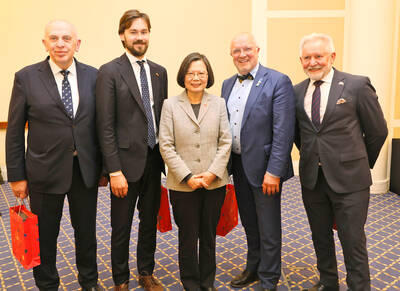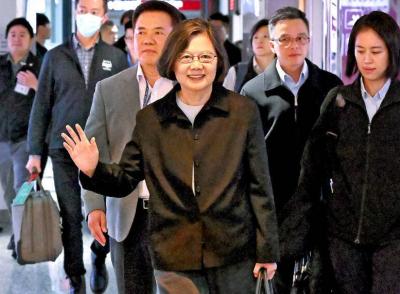Foreign nationals with alien permanent resident certificates or work permits can now take part in a job program that aims to get unemployed people back to work amid a local COVID-19 outbreak, the Ministry of Labor said yesterday.
The ministry last year rolled out the “Peace of Mind Employment Plan,” which encourages the public and private sectors to offer part-time jobs to unemployed people aged 15 or older, as the nation battles rising unemployment due to the pandemic.
Under the program, workers are offered part-time jobs that pay NT$160 per hour for no more than 80 hours per month. The maximum a participant can earn per month is NT$12,800, with the ministry subsidizing their salaries.
The program was open only to Taiwanese and their foreign and Chinese spouses, but starting today, foreign nationals with permanent residency or a work permit can also apply to take part, the ministry said.
The ministry estimated that more than 12,000 foreign nationals would be eligible for the program.
Those who wish to join the program can visit the Chinese-language Web site special.taiwanjobs.gov.tw/internet/2020/pjbtwn/page-01.html and file an application.
The ministry on Tuesday also announced that it would soon begin offering subsidies of up to NT$20,000 to unemployed workers who find a new job.
An updated version of the Peace of Mind Employment Plan is to be rolled out on Monday next week, with new incentives to help unemployed people rejoin the workforce.
Under the current plan, employers who hire a person who has been involuntarily unemployed for at least 30 days through a government job center can receive a monthly subsidy of NT$5,000 for up to six months.
In the new version of the policy, employers would receive the same NT$30,000 maximum in subsidies over four months, while the requirement that a hiree must have been unemployed for more than 30 days would be removed, said Wu Shu-ying (吳淑瑛), an official at the Workforce Development Agency’s employment services division.
The main difference would be that involuntarily unemployed people would also be eligible for up to NT$20,000 in subsidies over four months if they find a new full-time job, Wu said.
Unemployed people who find part-time jobs would still be eligible for NT$10,000 over four months, while their employers would receive NT$15,000 over the same period, she said.
To qualify for the benefits, employers must register with the ministry’s Taiwan Jobs Web site, and must hire and enroll new employees onto the government’s labor insurance program by Sept. 30, Wu said.

Former president Tsai Ing-wen (蔡英文) on Monday called for greater cooperation between Taiwan, Lithuania and the EU to counter threats to information security, including attacks on undersea cables and other critical infrastructure. In a speech at Vilnius University in the Lithuanian capital, Tsai highlighted recent incidents in which vital undersea cables — essential for cross-border data transmission — were severed in the Taiwan Strait and the Baltic Sea over the past year. Taiwanese authorities suspect Chinese sabotage in the incidents near Taiwan’s waters, while EU leaders have said Russia is the likely culprit behind similar breaches in the Baltic. “Taiwan and our European

The Taipei District Court sentenced babysitters Liu Tsai-hsuan (劉彩萱) and Liu Jou-lin (劉若琳) to life and 18 years in prison respectively today for causing the death of a one-year-old boy in December 2023. The Taipei District Prosecutors’ Office said that Liu Tsai-hsuan was entrusted with the care of a one-year-old boy, nicknamed Kai Kai (剴剴), in August 2023 by the Child Welfare League Foundation. From Sept. 1 to Dec. 23 that year, she and her sister Liu Jou-lin allegedly committed acts of abuse against the boy, who was rushed to the hospital with severe injuries on Dec. 24, 2023, but did not

LIKE-MINDED COUNTRIES: Despite the threats from outside, Taiwan and Lithuania thrived and developed their economies, former president Tsai Ing-wen said Former president Tsai Ing-wen (蔡英文) on Saturday thanked Lithuania for its support of Taiwan, saying that both countries are united as partners in defending democracy. Speaking at a reception organized by the Lithuania-Taiwan Parliamentary Friendship Group welcoming her on her first visit to the Baltic state, Tsai said that while she was president from 2016 to last year, many Lithuanian “friends” visited Taiwan. “And I told myself I have to be here. I am very happy that I am here, a wonderful country and wonderful people,” Tsai said. Taiwan and Lithuania are in similar situations as both are neighbors to authoritarian countries, she

Former president Tsai Ing-wen (蔡英文) is to visit the UK during her ongoing European trip, which originally included only Lithuania and Denmark, her office said today. Tsai departed Taiwan for Europe on Friday night, with planned stops in Lithuania and Denmark, marking her second visit to the continent since her two-term presidency ended in May last year. Her office issued a statement today saying that Tsai would also visit the UK "for a few days," during which she is to meet with UK politicians and Taiwanese professionals, and visit academic and research institutions. Following Tsai's stop in Denmark, she is to visit the